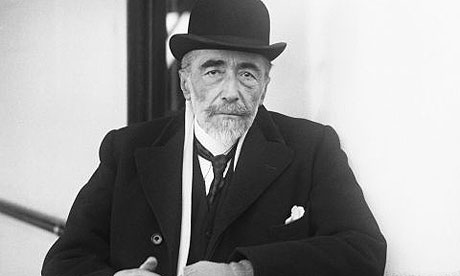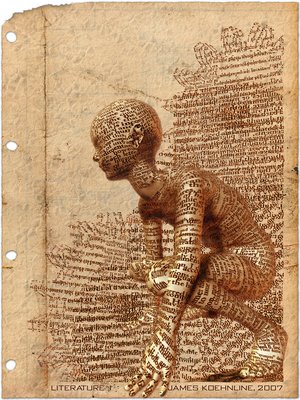[tweetmeme source=”jjdanz” only_single=false service=ow.ly]
Terabytes of bandwidth have been devoted to exploring literary versus genre fiction (See here, here, and here for examples). After reading many of these kinds of blog posts and articles, I am left with one question: Who cares?
I love to read, but not just for the sake of reading. I like books with gravitas and subtext. I like books that resonate. The setting of the story is immaterial if the story is compelling and has those elements I enjoy. Give me George R.R. Martin, Neal Stephenson and China Mieville. Give me Steinbeck, Hemingway and Norman Mailer.
And you can call me a literary reader while you’re at it.
Take a look at the definition of the word ‘literary’:
- pertaining to or of the nature of books and writings, esp. those classed as literature: literary history.
- pertaining to authorship: literary style.
- versed in or acquainted with literature; well-read.
- engaged in or having the profession of literature or writing: a literary man.
- characterized by an excessive or affected display of learning; stilted; pedantic.
- preferring books to actual experience; bookish.
Definition #1 refers to literature as a type of written work, so let’s look at the definition of ‘literature’:
- writings in which expression and form, in connection with ideas of permanent and universal interest, are characteristic or essential features, as poetry, novels, history, biography, and essays.
- the entire body of writings of a specific language, period, people, etc.: the literature of England.
- the writings dealing with a particular subject: the literature of ornithology.
- the profession of a writer or author
- literary work or production.
- any kind of printed material, as circulars, leaflets, or handbills: literature describing company products.
- Archaic. polite learning; literary culture; appreciation of letters and books.
Labels like “genre” and “commercial” and “literary” are merely constructs. They are descriptors to help sell and shelve books, to let people know what they can expect when they crack the cover. However, in labeling books as such, there is an implicit statement of what the book is not.


And that’s the problem. Many people never explore books that they might love because they’ve been convinced that something is above or beneath them.
Look, there are great writers producing wonderful, meaningful works throughout the fiction spectrum. And I suppose it’s good mental calisthenics to mull over this false dichotomy. But let’s be realistic: There’s tripe in all forms of fiction, from the most hackneyed derivative fantasy novel to the stultifying pretentious novel of self-discovery.
However, today’s tripe may be tomorrow’s literature as works are read and re-read and contemplated and appreciated, so how the hell do you predict what, exactly a book is without the benefit of time? Had The Count of Monte Cristo (Historical Fiction), or Dr. Jekyll and Mr. Hyde (Horror), The Tell-Tale Heart (Horror), 20,000 Leagues Under the Sea (Steampunk) or The Time Machine (Steampunk) been written today, they would likely be considered genre fiction.
In a June 2006 interview with John Updike on The Charlie Rose Show, Updike stated that he felt this term [literary], when applied to his work, greatly limited him and his expectations of what might come of his writing, and so does not really like it. He said that all his works are literary simply because “they are written in words.”
I don’t want the preconceived notions that hang on labels of “literary” or “genre”. Just give me the book and let me read.

As someone who enjoys both Conrad and King, I couldn’t agree more, esp. with the rejection of labels. I’m a very eclectic reader; my reading choices span the genres. All I’m ever looking for is a good story.
Who’s got time to judge the how to categorize the story when you’re immersed in it? Who wants to? I love this from the first definition of literature:
I’ve read stories from all genres (including literary!) that do this. More please!
I can add nothing here other than: well said! 😉
Thanks, Jonathan!
Thanks!
I got turned off of the term “literary fiction” in college simply because my creative writing prof demanded we write it. And if she got a whiff of “genre,” she turned up her nose and gave us an F. Now I’ll read anything. ^_^
Yeah, because you wouldn’t want people to enjoy what they’re writing. Give them an F for not having the same sensibilities. Tear down others to elevate yourself.
I liked this excerpt from one of the blog posts I linked to in my post:
And this one:
Sorry, I went a little overboard there.
Heh.
So much to say. I was a book “snob” until I started writing full time…and a writer friend made me read Stephen King. His gift for storytelling is phenomenal. I know it’s redundant to say so, but nevermind.
I read a few Nicholas Evans books in between the “classics” so that I could be transported to the natural world he describes. I didn’t care for the stories much, but I loved the settings. I needed that break from thinking deeply over every sentence (English Lit major).
And right now my favourite book for character is Olive Kitteredge (can’t remember the author, offhand).
My point is that no matter what book, what genre, literary or not, there is something to be learned. As you say, books are labelled for shelving. Perhaps ebooks will eliminate this sort of limitation?
We should be so lucky. The biggest pitfall to thinking in a, “oh, I read this, but not that” way is how many good books get excluded. Why deny ourselves more good reading experiences? Congrats for widening your view. Too bad more readers/writers don’t follow suit.
I couldn’t agree more! I am still at a loss for words when asked what kind of fiction I write….I always want to say, “the book kind?” I also feel incredibly pretentious when I say I write literary fiction.
I remember the first time I came across a book described as “literary crime fiction” in the blurb. Presumably the marketing team were worried that the author’s fans would be put off if they thought her latest book was genre fiction.
Great post, but I’m afraid the categorising of books into literary and genre fiction will continue for a long time.
You’re right, the labels aren’t going away any time soon. I guess I don’t mind them until someone uses them as dividers between fiction of merit and trash.
“Had The Count of Monte Cristo (Historical Fiction), or Dr. Jekyll and Mr. Hyde (Horror), The Tell-Tale Heart (Horror), 20,000 Leagues Under the Sea (Steampunk) or The Time Machine (Steampunk) been written today, they would likely be considered genre fiction.” So true. I never thought of it like that.
I read all over the map. And I think my writing will be the same. I have too many interests to remain locked in to one particular ‘ genre’.
There is just too much to explore, no? If only we could get paid to read without the baggage of having to review. If you know of any opportunities like that, let me know!